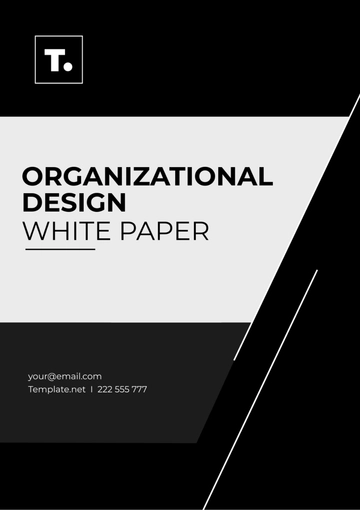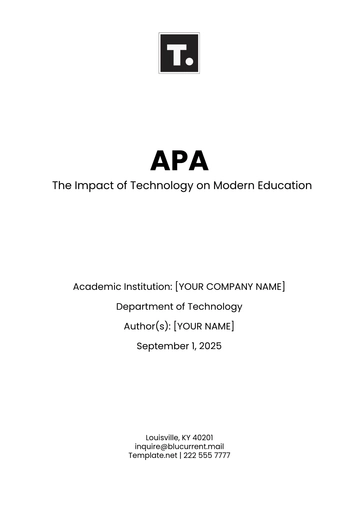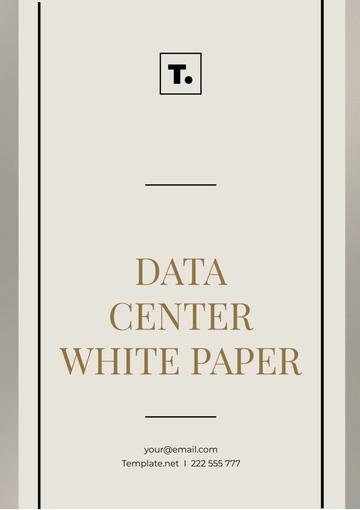Free Talent Management White Paper

I. Introduction

In today's competitive landscape, effective talent management is crucial for organizations to thrive. This white paper aims to provide comprehensive insights, strategies, and practical tips for [Your Company Name] to optimize its talent management practices. By aligning talent initiatives with organizational goals and leveraging innovative approaches, [Your Company Name] can cultivate a high-performing workforce and drive sustainable success.
II. Understanding Talent Management

Talent management encompasses the entire employee lifecycle, from recruitment to retention. It involves identifying, attracting, developing, and retaining top talent to meet current and future business needs. [Your Company Name] recognizes the importance of talent management as a strategic priority to maintain a competitive edge in the market.
A. Defining Talent Management
Talent management is the process of strategically identifying, acquiring, developing, and retaining top talent to meet organizational objectives. It involves various HR functions, including recruitment, performance management, learning and development, and succession planning.
B. Key Components of Talent Management
Recruitment and Selection: Attracting and hiring the right candidates with the skills, experience, and cultural fit to excel in their roles.
Performance Management: Setting clear expectations, providing feedback, and evaluating employee performance to drive continuous improvement.
Learning and Development: Investing in employee growth through training, coaching, and professional development opportunities.
Succession Planning: Identifying and developing future leaders to ensure a smooth transition of key roles within the organization.
III. Implementing Effective Talent Management Strategies
Successful talent management requires a strategic and integrated approach. [Your Company Name] can enhance its talent management practices by focusing on the following strategies:
A. Aligning Talent Management with Business Objectives
Align talent initiatives with [Your Company Name]'s overall goals and objectives to ensure that HR strategies support the organization's strategic direction.
B. Leveraging Technology Solutions
Invest in modern HR technology solutions to streamline talent processes, enhance data analytics capabilities, and improve decision-making.
C. Cultivating a Positive Organizational Culture
Foster a culture of continuous learning, collaboration, and innovation to attract, engage, and retain top talent.
D. Developing Leadership Capabilities
Invest in leadership development programs to nurture future leaders and build a pipeline of talent to drive organizational growth.
E. Promoting Diversity and Inclusion
Create a diverse and inclusive workplace where all employees feel valued, respected, and empowered to contribute their unique perspectives.
IV. Measuring Success and Continuous Improvement
To ensure the effectiveness of talent management initiatives, [Your Company Name] should establish key performance indicators (KPIs) and regularly monitor and evaluate progress. Continuous feedback and data-driven insights enable [Your Company Name] to refine its talent strategies and adapt to evolving business needs.
V. Conclusion

Effective talent management is a cornerstone of organizational success. By implementing the strategies outlined in this white paper, [Your Company Name] can build a high-performing workforce, foster innovation, and achieve sustainable growth in today's dynamic business environment.
Written by [Your Name]
- 100% Customizable, free editor
- Access 1 Million+ Templates, photo’s & graphics
- Download or share as a template
- Click and replace photos, graphics, text, backgrounds
- Resize, crop, AI write & more
- Access advanced editor
Unleash the power of effective talent management with the comprehensive Talent Management White Paper Template from Template.net. This editable and customizable solution offers unparalleled flexibility, ensuring your document perfectly aligns with your organization's needs. Seamlessly refine your strategies with our Ai Editor Tool integration. Elevate your talent management game with Template.net today.





























